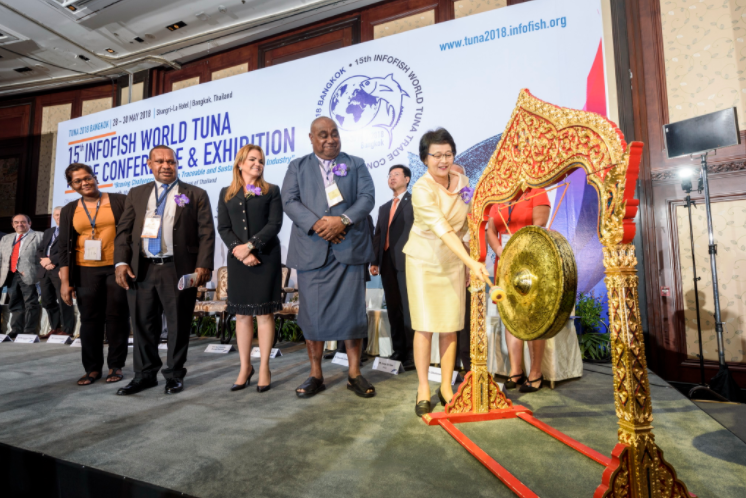15th INFOFISH WORLD TUNA TRADE CONFERENCE& EXHIBITION
[ 2018.06.01 ]
The 15th INFOFISH World Tuna Trade Conference and Exhibition started on 28th May in Bangkok at the Shangri-La hotel.
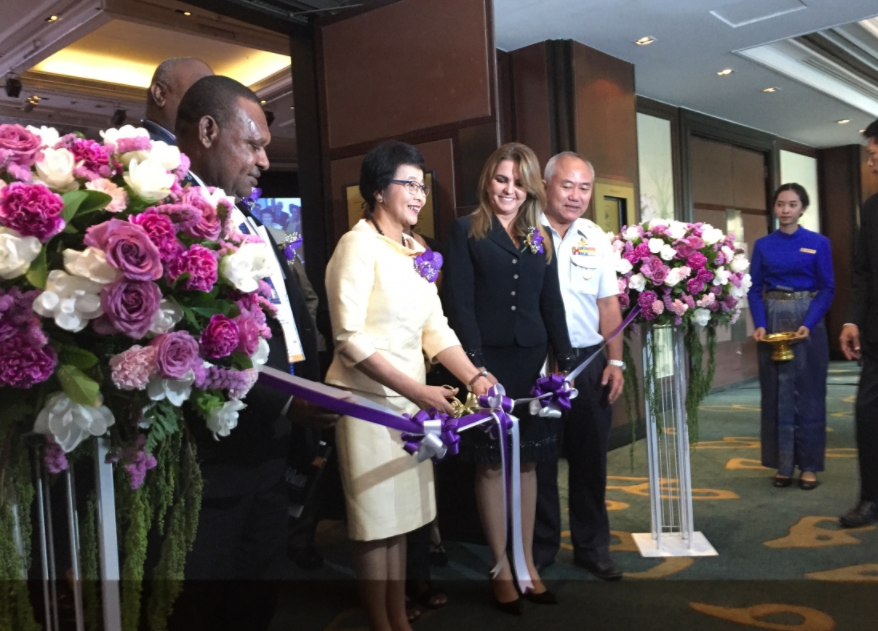
You could almost see the excitement and buzz in the air as close to 600 participants, including a stellar list of speakers, greeted each other, exchanged business cards, and toured the exhibition,debate and discuss the present challenges and opportunities in creating a socially, economically and environmentally sustainable global tuna market.
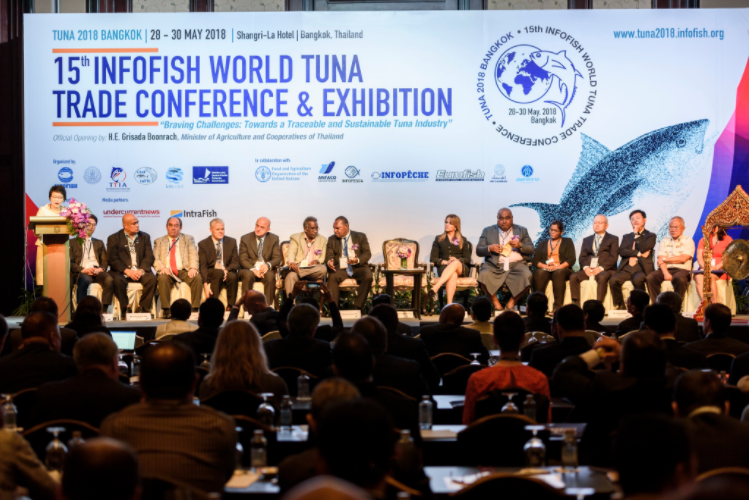
The three-day conference will take a close look at the latest developments in the global and regional tuna industries, and would cover a wide range of topics on resources, fisheries management, markets and marketing, products and quality developments, new technology, trade and food safety as well as sustainability, eco-labelling and environmental issues.
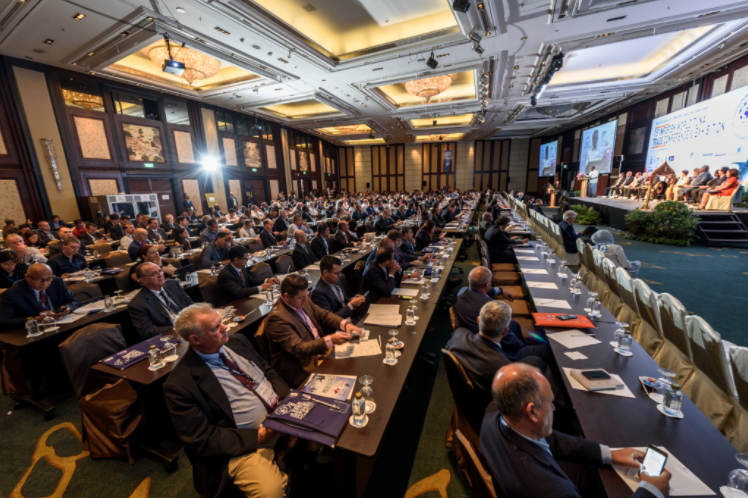
Ms Shirlene Maria Anthonysamy, Acting Director of INFOFISH then welcomed dignitaries and participants to the event and presented an overview of the theme ( “Braving Challenges: Towards a Traceable and Sustainable Tuna Industry” ) and the topics in the sessions ahead. Thanking participants for their presence, and the co-organising partners and sponsors for their support in making this important Conference a reality, she said that INFOFISH has the honour to provide a platform for the industry and that “this Tuna Trade Conference and Exhibition belongs to you, the industry”.
Next, the Conference Chair, Dr Transform Aqorau, presented a Special Address. He noted that he was honored to be the first Pacific Islander to chair a Conference of this scale and level of prestige. He said that it was only appropriate that the Conference is themed “Braving the Challenges”, one of which is stock management and traceability, developments in communications notwithstanding. He said that there are still gaps which are difficult to monitor because of the vastness of the ocean and that many fishers are just simple stakeholders who just want to earn a living. Therefore any strategy must take into account the wide range of expectations from all quarters – the fishers, communicators, NGOs, RFMOs, etc. He stressed that the industry has a big role to play in sustainability and social responsibility of the industry, certification, eco-labelling, IUU fishing and we need to work with each other to find common solutions to common challenges. He posed some questions: what is the industry doing to reduce its carbon footprint related to climate change? How should FADs be managed? Have tuna stocks reached maximum capacity? How well can we manage stocks of tuna below the water? How well are we addressing IUU fishing? At the very least, everyone must fish by the same rules.
Mr Jong Jin Kim, Deputy Regional Representative for Asia and the Pacific, of the Food and Agriculture Organization of the United Nations (FAO-RAP) said it is clear that sustainability can be achieved only by government and industry working together with science based management. Fighting hunger while providing sustainable food is part of the Sustainable Development Goals 2and 14. At the same time,on IUU fishing, FAO is encouraging the international industry to sign and implement the relevant international accords such as the Port State Measures Agreement (PSMA) ;”together we can feed the world and manage our fisheries”.
HE Ana Katuska Drouet Salcedo , Hon Minister of Fisheries Ecuador, spoke about government and industry working together in solidarity in order to increase the economic impact of the fisheries industry. It is a challenge as resources below the sea are finite but at the same time we need to boost earnings, safeguard decent work standards, and expand the private sector. She said that Ecuador is a world leader in fisheries and that “our brand – Ecudorian tuna –is world renown”, having its own certification programme which is in line with global standards. She ended by saying that Ecuador is open to investment and discussions on collaboration.
HE Patrick Basa, Hon Minister of Fisheries, Papua New Guinea, then presented his Special Address. He said that RFMOs and flag states must ensure appropriate management measures to ensure sustainability. Any discussion on tuna trade and markets must take into account where the tuna is caught, ie mostly in the Pacific region, and the way it is processed and marketed. PNG has a robust plan to monitor IUU fishing and the government is also working on enhancing competitiveness of the country’s exports .
The Opening Address was delivered by Dr Juadee Pongmaneerat, Chief of Inspector General, Ministry off Agricuture and Cooperatives Thailand, representing the Hon Minister H.E. Grisada Boonrach who was at an urgent Cabinet meeting. Dr Juadee acknowledged that although the Thai tuna industry is among the world’s top tuna exporters, there are challenges that the government is committed to addressing such as the need to ensure that tuna and tuna products are of high quality and meet international standards; the need to comply with IUU regulations; and enhancing traceability.
She said that in terms of IUU fishing, the government has issued and implemented the Royal Ordinance on Fisheries BE 2558 and BE 2017 to enhance sustainable fisheries management. Thailand has also formally acceded to the FAO’s Port State Measures Agreement and the Convention of the Law of the Sea (1982). She hoped that through the conference, a common understanding can be created towards sustainable development of the global tuna industry.
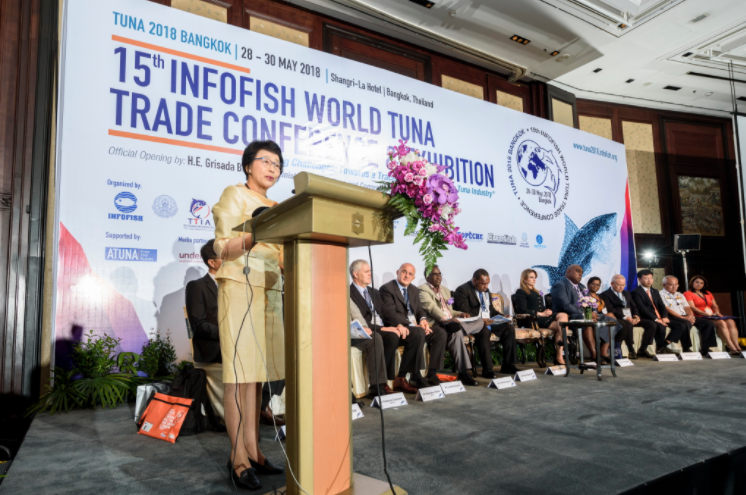
Dr Juadee was then invited to bang the gong on the stage to declare the Conference open, as well as to cut a ribbon to launch the Exhibition.
